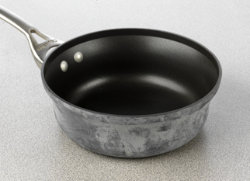Anodized cookware should not be put in the dishwasher. The harsh environment can damage the finish and degrade its nonstick properties.
Can You Put Anodized Cookware in the Dishwasher:Anodized cookware is prized for its durability and ability to conduct heat efficiently, making it a favorite among home cooks and professional chefs alike. Its anodized surface is designed to resist corrosion and prevent food from sticking, but it requires proper care to maintain these qualities.
Dishwashers can introduce high temperatures, strong detergents, and potential abrasion, all of which may harm the anodized coating. To preserve your cookware’s integrity and extend its lifespan, it’s best to hand-wash these items with mild soap and warm water. Taking this extra step ensures that your anodized pots and pans remain in top condition, helping you to achieve the best results in your culinary endeavors.
:max_bytes(150000):strip_icc()/faw-detail-kitchenaid-hard-anodized-induction-10-piece-nonstick-cookware-set-14-wdickey-272-ab10854e2a2e4c37b365f13cc9a1c70e.jpeg)
Credit: www.foodandwine.com
Introduction To Anodized Cookware
Anodized cookware revolutionizes home cooking with its robust features. Durable and resistant to corrosion, these pieces are a kitchen favorite. Their non-stick surface makes cooking and cleaning a breeze.
The Appeal Of Anodized Cookware
Anodized cookware’s popularity stems from its hardened surface and even heat distribution. Lightweight yet sturdy, it suits every cooking style. Professionals and home chefs alike prize it for its longevity and non-reactive nature.
- Scratch-resistant: Utensils won’t damage the surface.
- Healthier cooking: Less oil is needed due to its non-stick nature.
- Easy to clean: Simple wipe-downs often suffice.
Common Misconceptions
Some believe that anodized cookware is indestructible. While tough, it still requires proper care. Misinformation about dishwasher safety also persists. Let’s debunk these myths and ensure your cookware lasts.
| Misconception | Truth |
|---|---|
| Anodized cookware is unbreakable. | It’s strong but can warp under extreme conditions. |
| Dishwashers are safe for anodized pieces. | Hand washing is recommended to maintain the non-stick surface. |
The Dishwasher Debate
The Dishwasher Debate often stirs up among cooking enthusiasts. Is it safe to put anodized cookware in the dishwasher? Let’s dive into the pros and cons of using a dishwasher for these durable kitchen favorites.
Pros Of Dishwasher Use
- Time-saving: Dishwashers save precious minutes.
- Convenience: With a dishwasher, cleaning is just a button push away.
- Sanitization: High heat in dishwashers can kill more germs.
Cons Of Dishwasher Use
- Chemical Exposure: Dishwashing detergents can be harsh.
- Wear and Tear: The dishwasher’s environment can damage cookware over time.
- Non-stick Coating Damage: Potentially reduces the lifespan of non-stick layers.
Anodized cookware is known for its robustness. Yet, the dishwasher’s harsh conditions may challenge its integrity. Consider the impact of both convenience and care on your cookware’s longevity.
Anodized Cookware And Dishwasher Safety
Anodized cookware revolutionizes the kitchen with its durable, non-reactive surface. But, questions about its dishwasher safety often arise. Understanding the material and manufacturer guidelines is key. Let’s delve into whether anodized pots and pans belong in the dishwasher.
Material Composition
Anodized cookware features aluminum electrochemically hardened. This process creates a corrosion-resistant surface. It is harder than stainless steel. The anodized layer seals the aluminum, preventing leaching into food.
- Durable
- Non-reactive
- Scratch-resistant
Anodized surfaces withstand most kitchen abuses. Yet, harsh dishwasher detergents can damage them. Prolonged exposure to high heat and chemicals in a dishwasher may degrade the cookware’s finish.
Manufacturer Recommendations
Always check the manufacturer’s guidelines before dishwashing your cookware. Some brands claim their anodized products are dishwasher safe. Others caution against it to preserve the cookware’s integrity.
| Brand | Dishwasher Safe |
|---|---|
| Brand A | Yes |
| Brand B | No |
Hand washing with mild soap and a soft sponge is a safer bet. It extends the life of your anodized cookware. It also maintains the cookware’s appearance and performance.
Remember, proper care ensures longevity and cooking efficiency. Be sure to follow the specific care instructions provided with your cookware.
Impact Of Dishwasher Detergents On Anodized Surfaces
Anodized cookware is prized for its non-reactive surface. Many wonder if it’s dishwasher safe. Dishwasher detergents can affect its integrity.
Chemical Interactions
Dishwasher detergents are harsh. They contain chemicals like sodium and chlorine. These can react with anodized surfaces.
- Sodium can corrode aluminum.
- Chlorine can cause pitting and discoloration.
Long-term Effects
Repeated exposure to dishwasher detergents can damage cookware. It leads to:
- Wear of the anodized layer.
- Loss of non-stick properties.
- Change in cookware color.
Hand washing is recommended. It preserves cookware condition.
Manual Cleaning Vs. Dishwashing
Choosing between manual cleaning and using a dishwasher for anodized cookware is crucial. Both methods have pros and cons. This section explores how each affects your cookware’s lifespan and your daily routine.
Preserving Cookware’s Lifespan
Hand washing anodized cookware is gentle. It helps maintain the non-stick surface. Use warm water and a soft sponge for best results. Avoid harsh detergents and abrasive pads. These can damage the finish.
Dishwashers use strong detergents and high heat. This can fade the anodized coating over time. Manufacturers often recommend hand washing to extend life. Yet, some modern anodized pots and pans are dishwasher-safe. Check the manufacturer’s guidelines.
Efficiency And Convenience
Dishwashers save time. They are perfect for busy lifestyles. Load the dishwasher, press start, and go. But, this convenience might compromise your cookware’s condition.
Manual cleaning offers control. You can treat each piece with care. It takes more time, but your cookware stays in top shape. Balance your schedule with the need to protect your investment.
- Dishwashers offer hands-off cleaning.
- Manual washing ensures gentle care.
- Check labels for dishwasher-safe options.
Credit: www.quora.com
Real-life Experiences
Many people wonder about dishwasher safety for anodized cookware. Let’s explore real user experiences and expert advice.
Testimonials From Users
- John, avid home chef: “I put my anodized pans in the dishwasher. They’re still perfect after a year!”
- Sarah, busy mom: “My anodized pots go into the dishwasher. It saves me so much time.”
- Mike, culinary student: “I hand-wash my anodized cookware. I don’t want to risk it.”
Expert Opinions
Experts often share their insights on cookware maintenance. They highlight proper care for longevity.
| Expert | Opinion |
|---|---|
| Chef Anna | “Hand-washing anodized cookware keeps it like new.” |
| Dr. Smith, Material Scientist | “Dishwashers can harm anodized surfaces over time.” |
| Linda, Kitchen Expert | “Some anodized items are dishwasher-safe. Check the manual.” |
Tips For Dishwashing Anodized Cookware
Anodized cookware is popular in kitchens worldwide. Its durability makes it a top choice. Yet, many wonder about dishwashing anodized pots and pans. Let’s explore the best ways to keep them clean in the dishwasher.
Pre-wash Recommendations
- Rinse cookware to remove loose food.
- Use a soft sponge for stuck-on food.
- Avoid harsh scrubbers that can damage the surface.
Optimal Dishwasher Settings
| Setting | Details |
|---|---|
| Gentle Cycle | Prevents damage from intense water pressure. |
| Air Dry | Reduces exposure to high heat that can discolor. |
| Mild Detergent | Protects the anodized layer from harsh chemicals. |

Credit: www.amazon.com
Alternatives To Dishwashing
Anodized cookware boasts durability and non-stick convenience. Yet, dishwashers can harm its finish. Explore alternatives to keep these kitchen gems gleaming.
Eco-friendly Cleaning Methods
Clean anodized cookware with eco-friendly options. Baking soda and vinegar lift stains without harsh chemicals. Follow these steps:
- Make a paste of three parts baking soda to one part water.
- Apply to the cookware’s surface.
- Scrub gently with a soft brush or sponge.
- Rinse thoroughly in warm water.
- Dry immediately with a soft cloth to prevent water spots.
Professional Care Tips
For longevity, professional chefs recommend specific care for anodized cookware:
- Use mild detergent for daily cleaning.
- Avoid abrasive sponges that scratch surfaces.
- Hand wash to maintain the non-stick layer.
- Store properly to avoid dings and scratches.
Protect your investment with these methods. Enjoy the benefits of anodized cookware longer.
Frequently Asked Questions
Can Anodized Cookware Go In The Dishwasher?
Most anodized cookware is not dishwasher safe. Washing it in a dishwasher can damage its finish and appearance. Always check the manufacturer’s recommendations before cleaning.
How Do You Restore Hard Anodized Cookware After Dishwasher?
To restore hard anodized cookware after dishwasher exposure, mix equal parts water and white vinegar. Apply this solution, then gently scrub with a soft sponge. Rinse thoroughly with water, and dry immediately to avoid water spots. Regular maintenance with this method keeps cookware in optimal condition.
How To Wash Hard Anodized Cookware In The Dishwasher?
Check your cookware’s label to ensure it’s dishwasher-safe. Use mild detergent and avoid high heat settings to prevent damage. Hand washing is recommended for longevity.
Can Anodised Cups Go In Dishwasher?
Anodised cups should not be placed in dishwashers as the harsh environment can damage the finish. Hand wash them to maintain their appearance and durability.
Conclusion
Wrapping up, it’s clear that anodized cookware requires careful handling. Before placing it in the dishwasher, always check the manufacturer’s guidance. This ensures your kitchen essentials maintain their quality and longevity. Embracing these tips can make a significant difference in preserving your cookware’s condition.
Remember, a little extra care goes a long way.





Leave a Reply